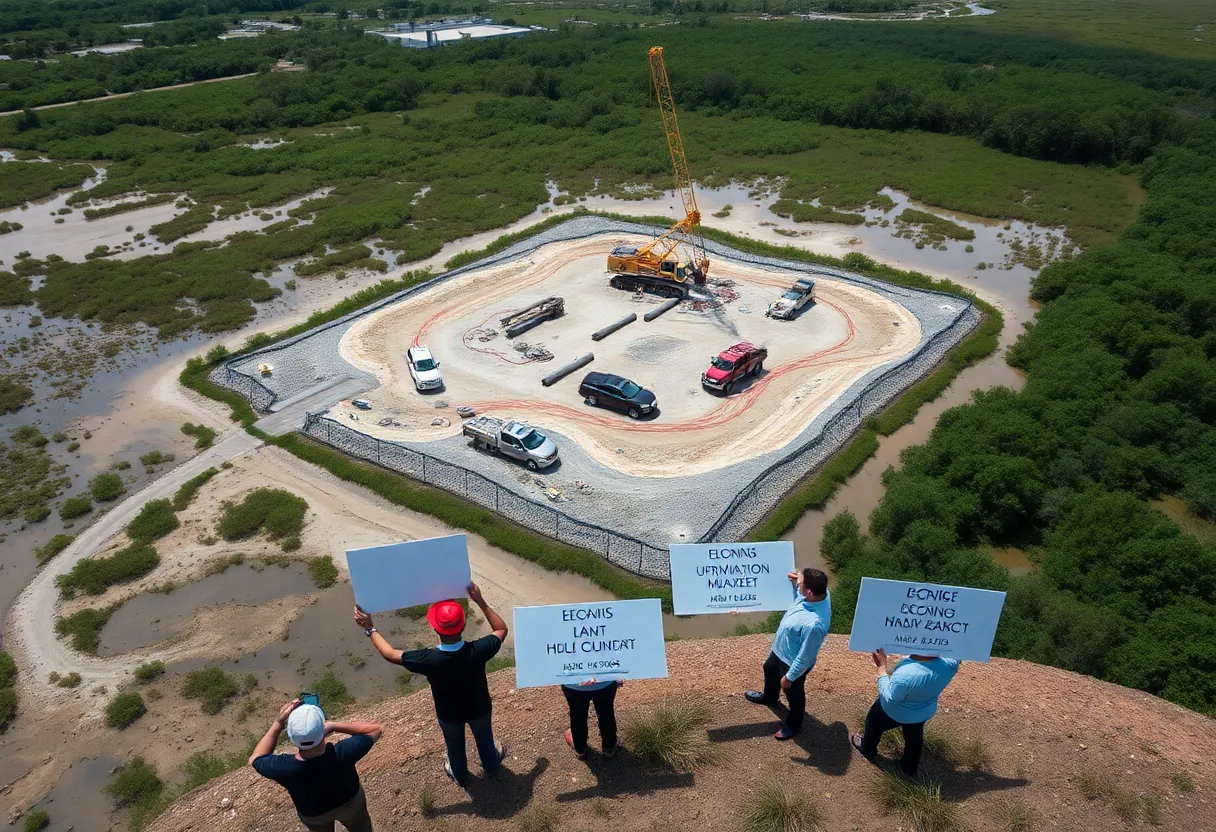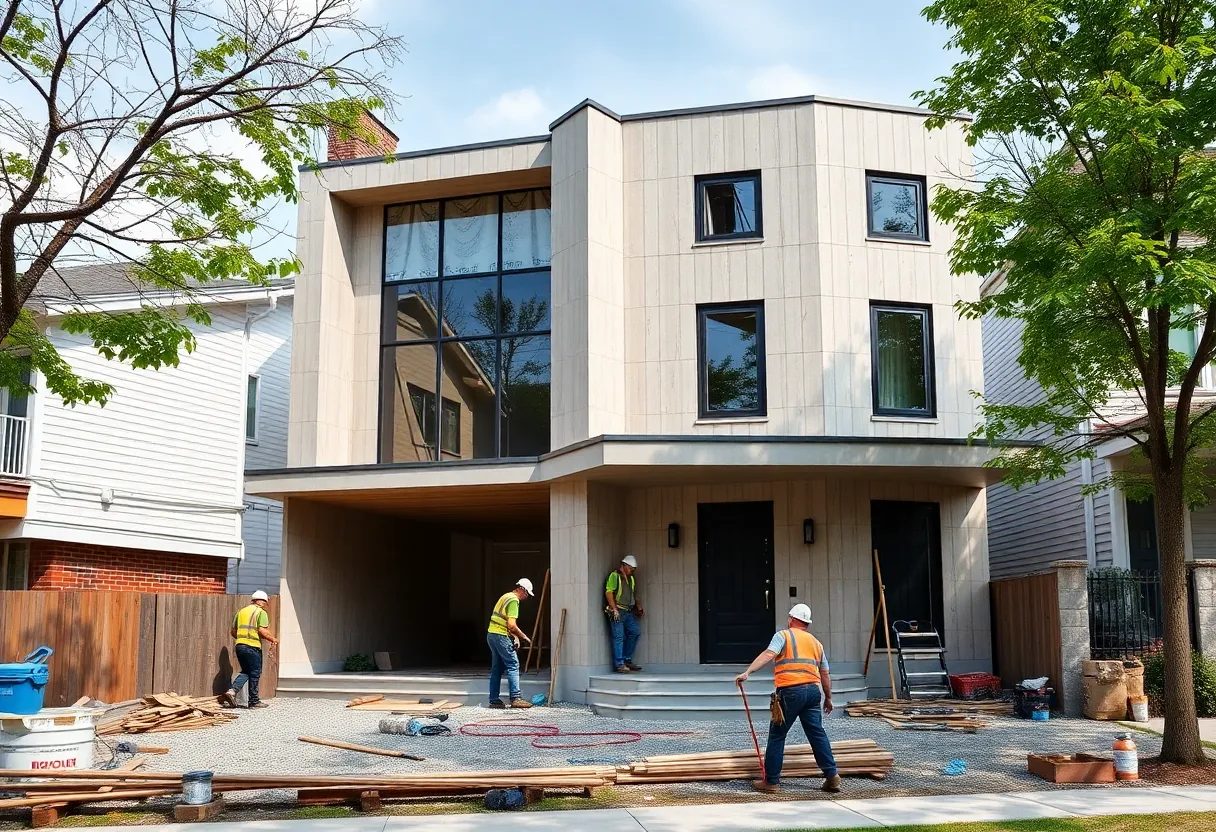News Summary
In Miami, a federal judge is considering an indefinite halt to the construction of an immigrant detention center dubbed ‘Alligator Alcatraz’ due to significant environmental concerns. The temporary restraining order has paused parts of the construction for hearings, prompting protests from environmental groups and the Miccosukee Tribe. The facility, now housing detainees, raises alarms over its impact on Florida’s fragile Everglades ecosystem. The ruling could greatly influence future immigration facilities and their ecological and social ramifications.
Miami, Florida — Federal Judge Considers Halting “Alligator Alcatraz” Construction Over Environmental Concerns
A federal judge in Miami is currently examining whether to impose an indefinite halt on the construction of a highly controversial immigrant detention center located in the Florida Everglades. Known colloquially as “Alligator Alcatraz,” the facility has raised significant environmental, legal, and community concerns since its rapid development began two months ago.
Current Status and Temporary Orders
U.S. District Judge Kathleen Williams issued a temporary restraining order that paused some aspects of construction for two weeks, allowing witness testimonies to be heard. The interim order specifically prohibits the installation of new industrial lighting, as well as paving, filling, excavating, fencing, or the erection of additional buildings or facilities at the site.
Importantly, the order does not impact ongoing law enforcement or immigration enforcement activities within the detention center. The facility, currently housing hundreds of detainees, was built swiftly at a lightly used training airport with an initial capacity to hold up to 3,000 individuals in temporary tent structures.
Legal and Environmental Challenges
Environmental groups and the Miccosukee Tribe of Native Americans filed for a preliminary injunction to halt both operations and further construction. Their primary concern relates to the potential harm the facility poses to environmentally sensitive wetlands in the Everglades, which play a critical role in regional ecology and water quality.
Witness testimonies highlighted that the construction has added at least 20 acres of asphalt, which could increase water runoff into ground and surface waters, risking contamination of the nearby Everglades. These runoff issues could carry nutrients and pollutants into tribal lands, threatening local vegetation, fish populations, and wildlife movement. Such ecological disturbances threaten to reverse billions of dollars invested in environmental restoration projects in the region.
Environmental Law and Jurisdictional Disputes
Legal advocates for the environmental groups and tribe assert that the construction violates the National Environmental Policy Act (NEPA), which mandates environmental assessments for large federal projects. They argue that federal environmental reviews should apply due to the nature of the project and the involvement of federal agencies.
Attorneys representing state and federal agencies contend that the facility is under state jurisdiction and that existing environmental reviews are sufficient, claiming federal laws do not apply. The judge acknowledged the collaboration between state and federal authorities in the project but has yet to decide if jurisdiction lies with federal courts or state agencies.
Impacts on Environment, Culture, and Community
Testimonies indicated that runoff and construction activity may impair habitat quality, leading to decreases in protected plant and animal populations. The Miccosukee Tribe expressed concerns over diminished game animals and potential impacts on traditional hunting and fishing practices.
Efforts to monitor water quality and ecological health emphasize risks of nutrient overloads, fish kills, and disruption to wildlife corridors. There are fears that increased human activity might degrade the cultural and subsistence resources vital to tribe members.
Immigration and Security Aspects
The detention complex was built partly to alleviate overcrowding at other facilities and to support immigration enforcement efforts. State officials confirm that the Everglades site allows for the detention of undocumented migrants under an agreement with Homeland Security.
In addition, legal arguments from government attorneys suggest that the project’s purpose is legitimate, and they have requested dismissals or transfers of legal challenges based on jurisdictional issues. The federal judge has yet to rule on these motions.
A second legal challenge is also ongoing, with a hearing scheduled in August. This lawsuit alleges violations of detainees’ constitutional rights, citing restrictions on lawyer visits, indefinite detention without charges, and the cancellation of bond hearings.
Broader Planning and Political Context
Florida officials are planning a second immigration detention facility, referred to as the “North Detention Facility,” projected to be built on a National Guard training site in northern Florida. This new site could initially house 3,000 individuals, with potential capacity expansion to 5,000.
Former President Donald Trump has publicly visited the detention center, portraying it as a model for more aggressive immigration enforcement. State authorities emphasize that the facility’s purpose is to serve as a deterrent to illegal immigration and bolster border security.
Community and Advocacy Responses
Protests involving immigrant advocacy groups, environmental organizations, and Native American communities have taken place near the site. Participants voice concerns over environmental degradation, the project’s location within culturally significant areas, and potential infringements on indigenous rights and traditions.
Moving forward, the legal proceedings, including the judge’s decision on jurisdiction and the injunction request, will significantly influence the future of the “Alligator Alcatraz” project and its environmental and social implications.
Deeper Dive: News & Info About This Topic
HERE Resources
Federal Court Halts Construction at Immigration Detention Center
Fear of ICE Raids Disrupts Lives of High School Students in Los Angeles
Lake Washington Theater Manager Detained by ICE
Additional Resources
- CNN: What is Alligator Alcatraz in Florida?
- Wikipedia: Immigration Detention in the United States
- The New York Times: Chaotic Early Days Inside Florida’s Alligator Alcatraz
- Google Search: Alligator Alcatraz
- ABC News: Florida Attorney General Proposes Alligator Alcatraz Migrant Detention
- Google Scholar: Alligator Alcatraz Detention Center
- AP News: Florida’s Alligator Alcatraz Immigration Detention Issues
- Encyclopedia Britannica: Immigration Detention
- AP News: History of Florida’s Alligator Alcatraz
- Google News: Florida Alligator Alcatraz
Author: STAFF HERE WASHINGTON DC
The WASHINGTON DC STAFF WRITER represents the experienced team at HEREWashingtonDC.com, your go-to source for actionable local news and information in Washington, DC, and beyond. Specializing in "news you can use," we cover essential topics like product reviews for personal and business needs, local business directories, politics, real estate trends, neighborhood insights, and regional news affecting the area—with deep expertise drawn from years of dedicated reporting and strong community input, including local press releases and business updates. We deliver top reporting on high-value events such as the National Cherry Blossom Festival, Kennedy Center Honors, and the Washington Auto Show. Our coverage extends to key organizations like the Greater Washington Board of Trade and Destination DC, plus leading businesses in government contracting and technology that power the local economy such as Lockheed Martin and Amazon. As part of the broader HERE network, we provide comprehensive, credible insights into the dynamic landscape of the Washington metropolitan area.




